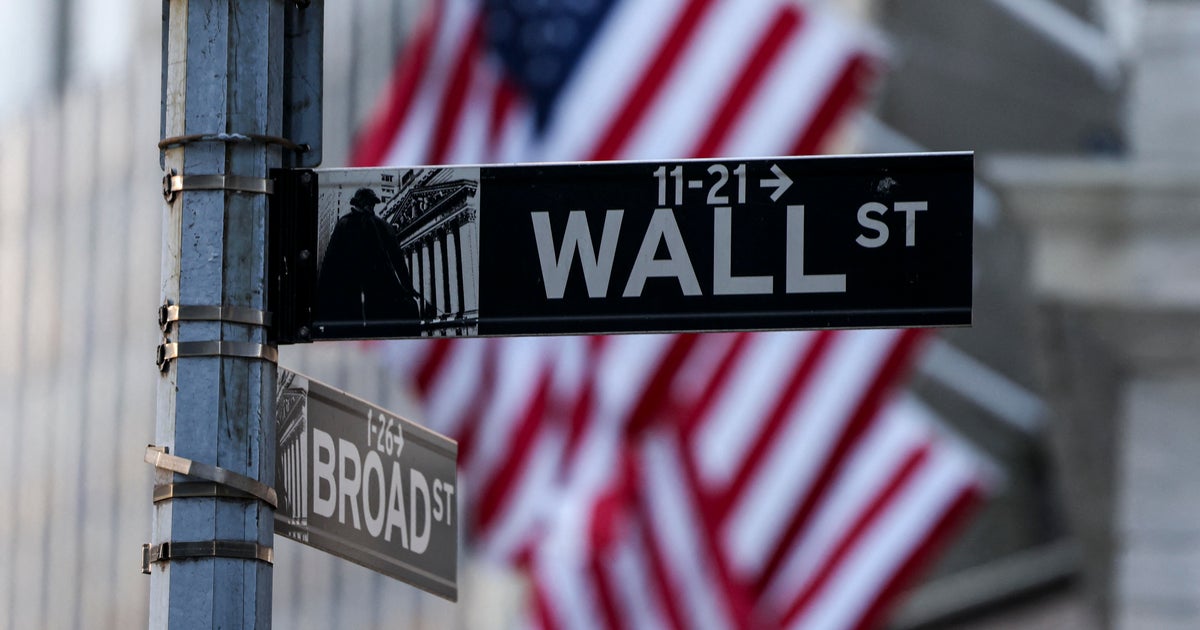Stocks close down for the week as investors keep wary eye on Ukraine and Fed
Stocks closed down for a second straight week in the U.S.— and sunk deeper into the red for 2022 so far — as investors assess the risks from escalating tensions in Ukraine and a shift in monetary policy by the Federal Reserve.
After another day of turbulence, the Dow and the S&P 500 both fell 0.7% (with the Dow ending Friday at 34,079) and the tech-heavy Nasdaq composite declined 1.2%. The Nasdaq has fallen farthest of the three major U.S. stock indexes in 2022 to date, down 13.4% for the year as of Friday's close, while the S&P 500 is off 8.8% and the Dow is down 6.2%.
Markets were volatile all week as investors watch the latest developments in Ukraine, where Russia has been amassing troops on the border. The tensions are yet another concern for investors as they also try to determine how the economy will react to rising inflation and looming interest rate hikes.
A "trifecta" of risks
"Investors are facing geopolitical risks, Fed tightening and peak valuations," said Peter Essele, head of portfolio management for Commonwealth Financial Network. "Anytime you get that kind of trifecta scenario, you're going to see volatility."
Inflation remains a key concern as companies continue facing supply-chain problems and higher costs, prompting warnings that operations will suffer through some or all of 2022.
General Electric fell 5.2% Friday after it warned that pressure from inflation and supply-chain backups have hurt several of its businesses, including health care, renewable energy and aviation. It expects the problems to persist through at least the first half of the year.
Video streaming company Roku slumped 22.5% after giving investors a weak revenue forecast and warning about persistent supply-chain problems.
Weakness from several big technology stocks, which have more weight on indexes because of their size, helped pull the broader market lower. Intel fell 4.9%.
Retailers and travel-related companies also lost ground. Amazon shed 0.6% and Royal Caribbean fell 1.1%
Companies viewed as less risky investments, such as utilities, held up better than the rest of the market.
Bond yields fell, with the yield on the 10-year Treasury dropping to 1.93% from 1.97%.
Wall Street concerns over Russia and Ukraine have been growing all week, throwing a curveball to markets that have been more focused on inflation, central banks' monetary policy and economic growth.
Anne Neuberger, deputy national security adviser for cyber and emerging technology, told reporters Friday the U.S. is now attributing the cyberattack in Ukraine earlier this week to Russia. She said the impact was limited, but warned of more likely cyberattacks from Moscow. On Thursday, the Senate passed a bipartisan resolution supporting Ukraine in the face of increased Russian aggression.
"Our base case remains that we are likely to see a continuously simmering standoff with periods of dialed-back tensions and potentially dangerous escalatory moments, overall raising market risk sentiment," analysts with investment bank Raymond James told investors in a report.
Rising energy prices
For investors, a key concern is that Russia is a major energy producer and a military conflict could disrupt energy supplies and make for extremely volatile energy prices. Such fears are one factor contributing to sharply higher fuel costs in the U.S.
Gasoline prices surged this week to their highest level in eight years, with the average price of a gallon of gas hitting $3.49 on Wednesday, according to AAA, up four cents from the previous week and roughly a dollar from a year ago. It is the highest price since October 2014, according to the Energy Department.
Investors are also focused on the Fed and its plan to raise interest rates in order to fight rising inflation. The latest minutes from a meeting of Fed policymakers confirmed that the central bank intends to move decisively to fight inflation with higher interest rates.
Wall Street is trying to look ahead to determine how a more aggressive monetary policy from the Fed will impact markets, especially after years of ultra-low interest rates.
Federal Reserve Bank of New York President John Williams said Friday the central bank should start raising interest rates next month to help rein in too-high inflation. But he added that the rate hikes may not have to begin with as big a bang as some have suggested.
"Personally, I don't see any compelling argument to take a big step at the beginning," Williams said.



